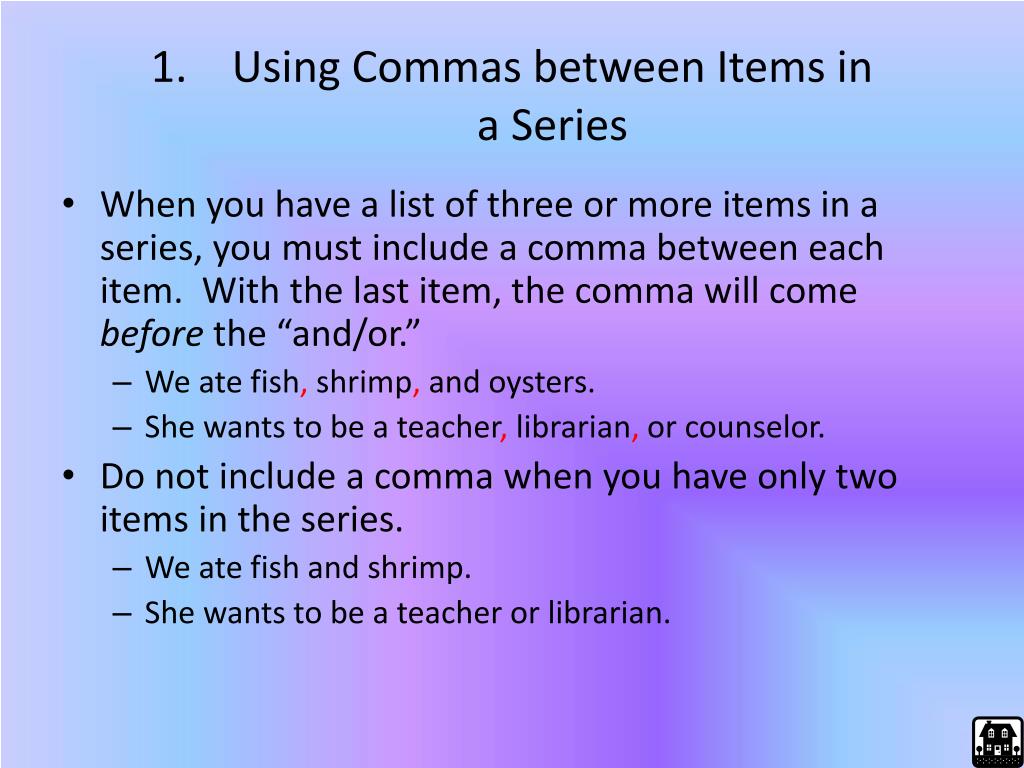Commas After Introductory Phrases Prepositional Phrases Use a comma to separate a group of prepositional phrases of more than four words when the phrases come at the beginning of a sentence.. Do not use a comma between separate phrases unless they are in a series.. A comma may also set off a single prepositional phrase at the beginning to make the sentence clear.If so, follow the phrase or clause with a comma (,) A punctuation mark used to group and separate information in sentences.. If there are two or more phrases and/or clauses before the subject, only put a comma after the last one. For example, read the following sentence and notice the introductory phrase that comes before the subject, which isIntroductory clauses often start with an adverb that is usually a dead giveaway. These introductory parts of the sentence require the use of a comma, but that is not always the case. You should use commas after introductory clauses, a long prepositional phrases, distinct pauses, and when you need to form a good bit of separation. TheseWhich sentence correctly uses a comma to separate the introductory phrase? A. Commerce is represented by, the female statue crowned with a wreath of olive leaves. B. The female statue, crowned with a wreath of olive leaves, represents commerce. C. Crowned with a wreath of olive leaves, this female statue represents commerce. D. The wreath of olive leaves crowning the female statue, representsWhich sentence is punctuated correctly? Commas with Introductory Phrases. 81% average accuracy. 1145 plays. K - University grade . English. rennerc. 4 years ago. 5. Save. Share. Edit. Copy and Edit. After school today I will teach all my friends, how to use commas correctly! After school today, I will teach all my friends how to use
NROC Developmental English Foundations
The answer depends on whether the clause introduced by so is an independent or dependent clause. If so begins an independent clause, a comma should precede it, but if it begins a dependent clause, leave it out. Let's have a look at how commas are used before so in the middle of a sentence.Separating an introductory phrase from the main sentence Separating an introductory phrase from the body of the sentence can often be done effectively using just a comma. When a comma is present in the introductory phrase, however, some writers prefer to separate the two sections with a dash.There are so many ways in which a comma is used in technical writing. A comma, for example, clarifies the meaning of a complex sentence in a technical document and helps us understand it better and quicker if the introductory phrase is separated from the rest of the sentence by a comma. This article provides many examples of how you can do that correctly and eliminate mistakes from yourUse a comma after introductory words (words that introduce [come before] a main clause). Here is an example of a sentence with introductory words: After the dance, they went home. They went home is the main clause.

Using Commas to Separate the Introductions Worksheets
Use a comma after a dependent introductory clause, phrase, or word. Example of introductory clause: If you are using this sentence structure, place a comma after the dependent clause. Example of introductory phrase: Before completing the interviews, I must obtain Walden University approval.After a long introductory prepositional phrase or more than one introductory prepositional phrase. After introductory verbal phrases, some appositive phrases, or absolute phrases. If there is a distinct pause. To avoid confusion. When not to use a comma. Some introductory elements don't require a comma, and sometimes the subject of a sentenceThe sentence that correctly uses a comma to separate the introductory phrase is the first one - Before researchers are granted access to the rare-book stacks, they must be approved through a security screening process.4. Use a comma after an introductory word, phrase or subordinate clause. A subordinate clause (also known as a dependent clause) is a part of a sentence that doesn't make sense standing on its own. When a word, phrase or subordinate clause is used at the beginning of a sentence, you need a comma to offset it from the main (independent) clause.Rule 5: Using a comma after an introductory phrase. A comma typically follows participial phrases that introduce a sentence. Right: Grabbing her car keys, Sharon sprinted out the front door. Whenever an adverbial phrase starts a sentence, it is typically proceeded by a comma, but this is not a 'set-in-stone rule', especially if it is short.
Question and resolution
Which sentence correctly uses a comma to separate the introductory phrase? A. Commerce is represented by way of, the female statue topped with a wreath of olive leaves. B. The female statue, crowned with a wreath of olive leaves, represents trade. C. Crowned with a wreath of olive leaves, this female statue represents commerce. D. The wreath of olive leaves crowning the feminine statue, represents commerce.
The sentence that correctly uses a comma to separate the introductory phrase is: Crowned with a wreath of olive leaves, this feminine statue represents trade
Get a solution
New solutions
Rating
There aren't any new answers.
How to Write

Comma Worksheets

Comma Worksheets

Rule 1.docx - Rule 1 Use commas to separate words and word ...

Punctuation marks examples sentence. Punctuation. 2019-03-07

How to Use English Punctuation Correctly (with Pictures ...

Major Comma Uses

How to Write

L2 Conventions - 5th Grade Common Core

Punctuate Me: Quotation Marks & Capitalization | Worksheet ...

Which of the following sentences is correctly punctuated ...

Englishlinx.com | Commas Worksheets

Author Ayden K. Morgen: Fun with Commas: Rules to Memorize

Those Pesky Commas!

PPT - Common Grammar Mistakes PowerPoint Presentation ...

Rules of Punctuation: The Comma - Public Relations

Commas after introductory material

An Introduction to Commas | The Nature of Writing

PPT - How Tia Lola Came to Stay PowerPoint Presentation ...

Introductory Clauses | Worksheet | Education.com

Guide to ACT Preperation by rbold







No comments:
Post a Comment